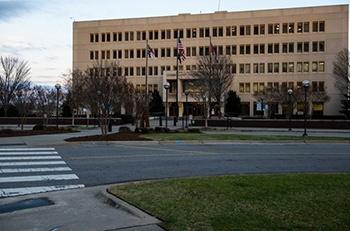
In a meeting following the public hearing, however, the board voted to raise the salary of Vice Chair Toni Stewart by $2,000 over a previously planned increase. The measure passed 4-2 with Commissioners Jimmy Keefe and Michael Boose voting in opposition.
Before that vote, the board considered a similar pay increase for all commissioners, except Chair Glenn Adams, but that motion failed 3-3. Boose, Keefe and Stewart voted in favor while Adams and Commissioners Larry Lancaster and Jeannette Council were against the plan.
Commissioner Charles Evans was not present for either vote or the public hearing.
Under the newly adopted budget, Adams will earn an annual salary of $31,100, and Vice Chair Stewart will earn $25,297. The rest of the commissioners will receive $23,297.
It’s an increase from last year’s budget, when commissioners approved a chair salary of $30,194 while the rest of the commissioners earned $22,619.
This is not including a 3% and 4% cost-of-living raise on the fiscal year 2022 and 2023 base salaries, respectively.
The cost-of-living raises also apply to county employees
The board did not discuss comments during the public hearing that called for increased education funding.
Commissioners did not immediately respond to emailed questions from Carolina Public Press concerning the votes for salary increases and calls for increased education funding in the public hearing.
The board approved $84.3 million in funding for Cumberland County Schools, lower than the $88.2 million requested by the school system, but the approved funding is an increase of $1.3 million from last year.
Commissioners also approved a $95,000 work study that will examine how to best retain workers amid what County Manager Amy Cannon had described at previous meetings as an employees’ market.
The approved budget did not increase property taxes or solid waste fees.
Calls for increased school funding
During the public hearing, education leaders in Cumberland County spoke to commissioners, advocating for the $88.2 million in the school board’s original request.
Among them was Cumberland Board of Education member Charles McKellar.
“I come from the business world, and I know the responsibilities of any organization,” McKellar said. “You have to plan for the future.”
While McKellar had previously voted against budgets recommended by the majority of the Board of Education, he said he supported this year’s request.
“I’m in total support of this year’s (school) budget, and the reason is it’s been simplified,” McKellar said. “You can understand where the money’s going.”
Heather Kaiser, a schoolteacher and president of the Cumberland County Association of Educators, said the budget decisions made by the Board of Commissioners will have a “lasting and far-reaching impact” on students, teachers and the community as a whole.
“Those of us with our boots on the ground need you to know that expecting Cumberland County Schools to continue to do more with less is not the way forward,” Kaiser said. “We cannot make progress and positively impact children under those conditions.”
Cynthia Brent, chair of the Fayetteville NAACP’s education committee, said more funding was needed to address how some students are falling behind academically. She noted that the N.C. Department of Public Instruction had classified 23 schools within the Cumberland County system as low-performing schools.
“The pandemic has exposed the need for additional resources,” Brent said.
“These resources include additional social workers, counselors, nurses and teachers assistants and also includes access to broadband, high-quality child care, after-school child care, quality summer programs and a committed community.”
Leslie Craig, a schoolteacher at Max Abbott Middle School, said school staff needed more income to pay for increasing costs due to inflation, particularly housing.
Craig cited her personal experience with the high cost of housing. She told commissioners that her rent had increased by $250 in the past year and that more affordable housing was not available to her.
According to Apartment List, a nationwide apartment listing service that also collects rental data, the average monthly rent in Cumberland County has increased from $995 two years ago to more than $1,300 last month.
“If teachers and support staff cannot meet their daily life needs for themselves and their families, particularly for housing, how can they stay in their jobs?” Craig said.
Per state requirements, the new budget that commissioners approved includes a new minimum wage of $15 an hour for certain school employees, as well as a 2.5% increase for anyone already at that pay grade.
Changes to budget
Some changes were made to the budget proposal that was presented last month after a few weeks of deliberation.
This includes $30,000 and $3,000 in additional funding for Cumberland HealthNet and the county’s Vision Resource Center, respectively.
To account for this, $33,000 in funding has been taken from the Arts Council of Fayetteville/Cumberland County.